Welcome to a practical guide on the Mediterranean diet—a lifestyle rich in tradition and health benefits. Originating from the sun-soaked shores of the Mediterranean Sea, the Mediterranean diet is revered not only for its flavors but also for its numerous health benefits, including enhanced heart health and longevity.
This way of eating goes beyond mere nutrition; it’s a full embrace of wholesome, unprocessed foods that are staples in the sunny Mediterranean region.
As someone who grew up in a Greek family in Canada, where my parents ran a busy restaurant, the kitchen was both my playground and classroom. Our kitchen was a place of endless activity, fresh ingredients, and a testament to how food is a pivotal part of our culture and wellbeing.
Keep reading to learn how the Mediterranean diet can enrich your life, both at the table and beyond.

My Mediterranean Heritage
Growing up, the Mediterranean diet was simply how we lived. My father consistently used fresh, local ingredients for his restaurant, and my mother regularly baked bread from her collection of sourdough starters. Snacks were straightforward, like feta and tomatoes smashed on fresh bread with oregano, and extra virgin olive oil straight from our family’s grove in Sparta, Greece.
Our garden was replete with fresh vegetables and fruits and we rarely bought store bought produce in the summer months. There were plenty of bean dishes made and fish was grilled weekly. This was just the diet I had always known, not a trend but a tradition.
The fusion of Greek culinary traditions with our Canadian setting deepened my appreciation of mealtime as a means to connect and share our culture.

Core Principles of Mediterranean Diet Recipes
At its core, the Mediterranean diet emphasizes a lifestyle deeply rooted in the enjoyment of natural, unprocessed foods. This is a sustainable and enriching way of life that offers proven health benefits.
Simply put, the Mediterranean Diet:
- Focuses on Vegetables, Fruits, and Whole Grains: Staples include fresh produce, whole grains, and healthy fats like olive oil.
- Chooses Seafood Over Red Meat: A preference for seafood over red meat, which is consumed less frequently, contributes to a heart-healthy eating pattern.
- Uses Herbs and Spices: A hallmark of the Mediterranean diet is its use of aromatic herbs and spices—such as garlic, basil, thyme, and rosemary—which enhance flavors naturally while offering health benefits through their anti-inflammatory and antioxidant properties.
- Encourages Moderation and Variety: The diet stresses the importance of moderation and variety. Portions are reasonable, and foods are consumed in season, ensuring peak flavor and nutrition.
- Includes Daily Physical Activity: Integral to this lifestyle is the inclusion of daily physical activity, because physical health and dietary habits go hand in hand.
- Prioritizes Community and Sharing: Eating is a social activity, which helps improve mental health and reduce stress, which can contribute to cortisol weight gain.
The Mediterranean diet naturally regulates calorie intake without the need for meticulous measuring or calorie counting. Its rich variety of fiber, healthy fats, protein, and antioxidants helps promote a healthy weight, reduce inflammation, and lower the risk of chronic diseases.
Embracing this lifestyle means adopting eating patterns that are not only healthy but also inherently enjoyable and sustainable, making it a practical choice for long-term health.
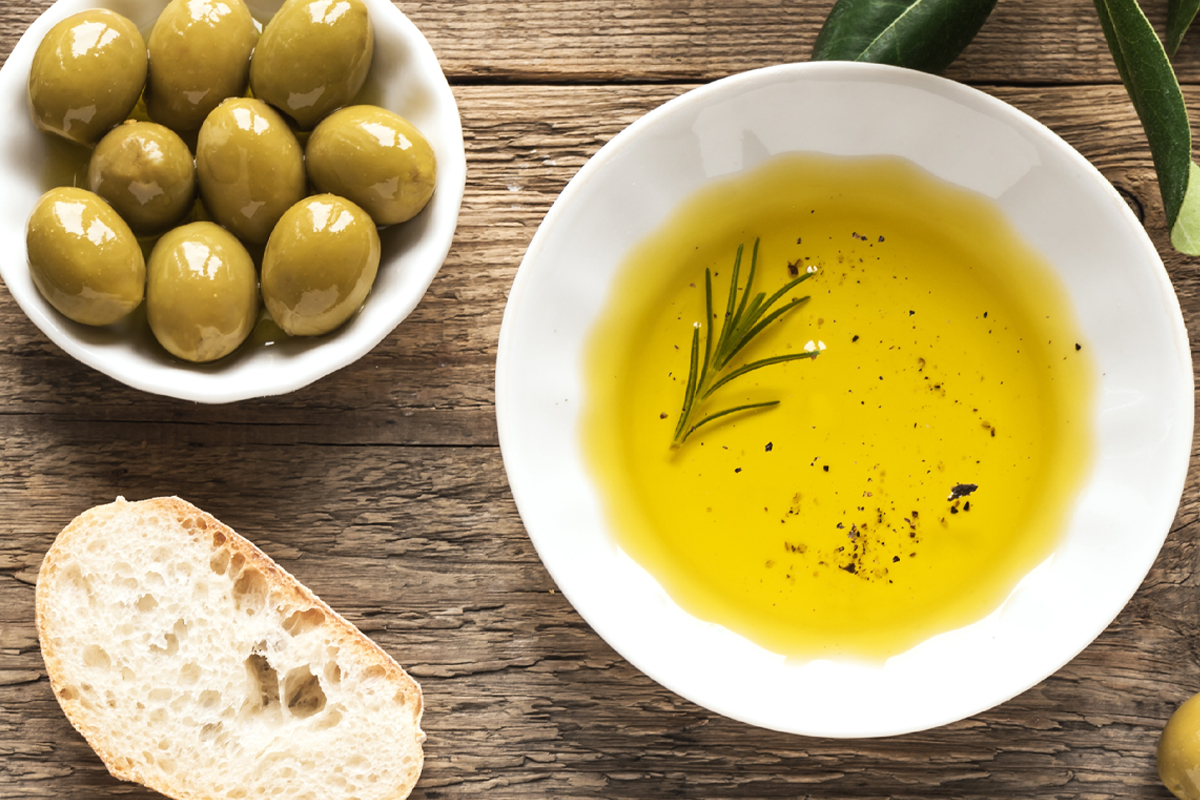
The Role of Olive Oil in the Mediterranean Diet
Many people hesitate to add fats to their diet, fearing weight gain or health issues. However, not all fats are created equal. Olive oil, a cornerstone of the Mediterranean diet, is a source of monounsaturated fats, which are known to be heart-healthy. Studies show that these fats can help reduce bad cholesterol levels and increase good cholesterol, contributing to heart health and reducing the risk of heart disease.
Incorporating olive oil into your diet should be done thoughtfully. It’s perfect for dressing salads, drizzling over cooked vegetables, or as a dip for bread. Unlike saturated fats, which can lead to health problems, olive oil offers a healthful alternative that enhances flavor without compromising well-being. Remember, moderation is key in maintaining a balanced diet.
Essential Mediterranean Ingredients
You might be surprised to find that you already have most of what you need to start cooking Mediterranean-style meals. Many staples of the Mediterranean diet are likely already in your pantry, making it easy to adopt this healthy and flavorful culinary style.
Mediterranean Diet Pantry Staples
- Olive Oil: A healthy fat essential for cooking and salad dressings.
- Whole Grains:
- Quinoa
- Whole wheat pasta
- Brown rice
- Farro
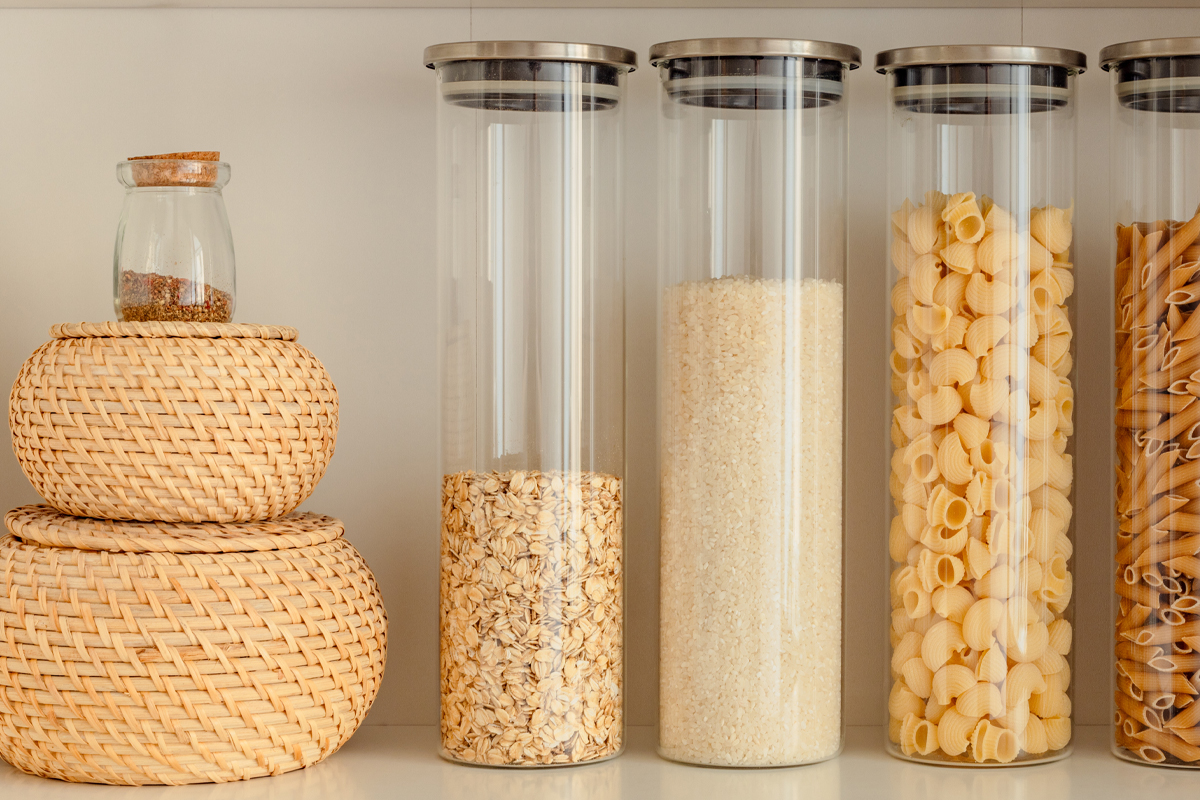
Shopping Fresh for Mediterranean Recipes
- Fruits and Vegetables:
- Leafy greens (spinach, kale)
- Tomatoes
- Cucumbers
- Bell peppers
- Seasonal fruits (apples, oranges, grapes, watermelon)
- Fish:
- Salmon
- Albacore tuna
- Shrimp
- Sardines
- Anchovies
By keeping these staples on hand and regularly selecting fresh produce and seafood, you can easily enjoy the Mediterranean way of eating.
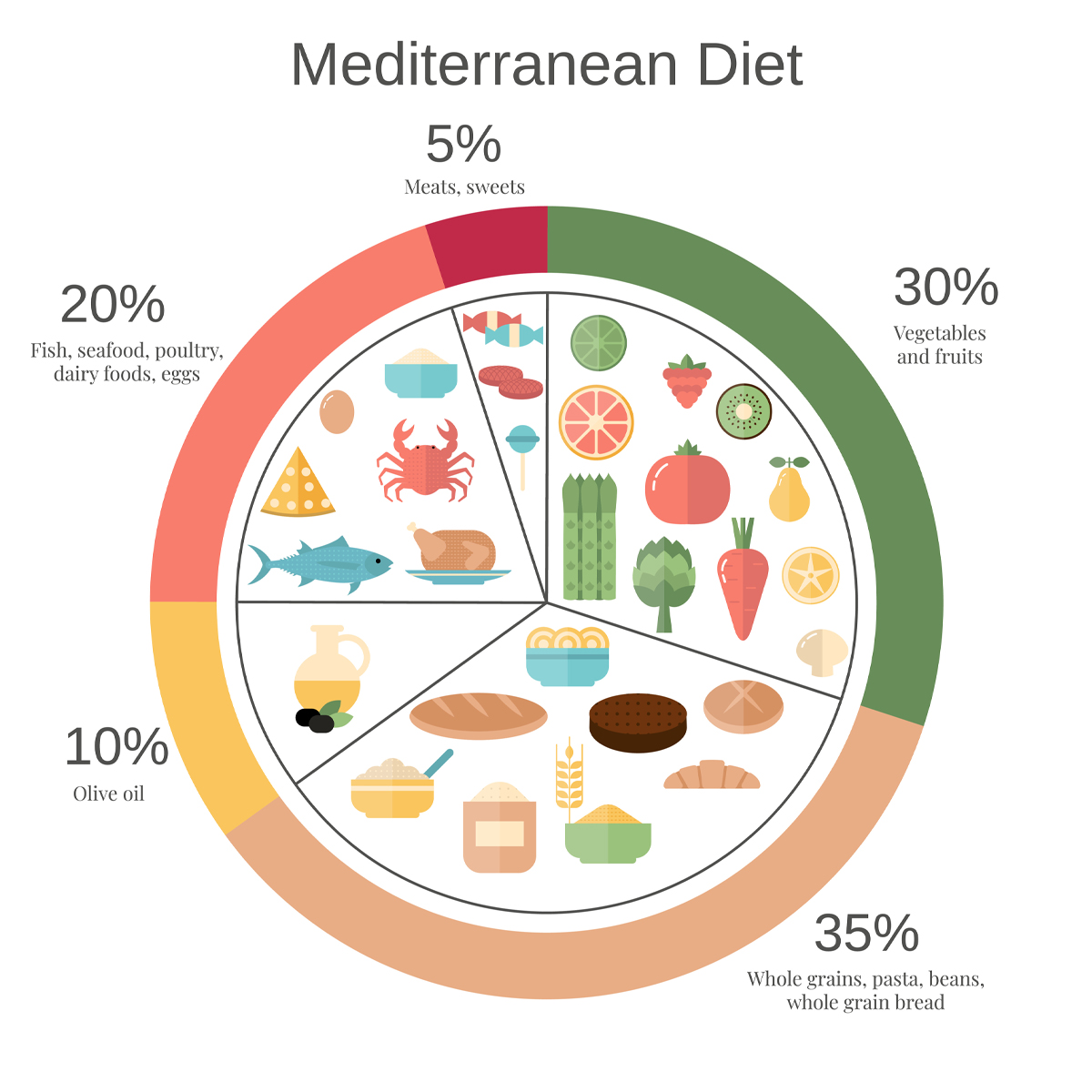
Popular Dishes from Our Family Restaurant
At our family restaurant, some dishes always had people coming back for more. Fresh Greek salads, bursting with ripe tomatoes, cucumbers, and a generous sprinkle of feta, were a staple. We also served a variety of grilled items, especially fish and chicken, which were marinated and cooked to perfection.
A crowd favorite was the traditional Greek white bean soup, known as ‘fasolada’. Its hearty and comforting flavor profile made it a must-try.
Olive oil played a dual role in our kitchen. Not only was it important for cooking, but we also placed bottles on each table, encouraging diners to dip bread into this rich, flavorful oil.
Easy Mediterranean Diet Recipes
Crockpot Fasolada (traditional Greek white bean soup)
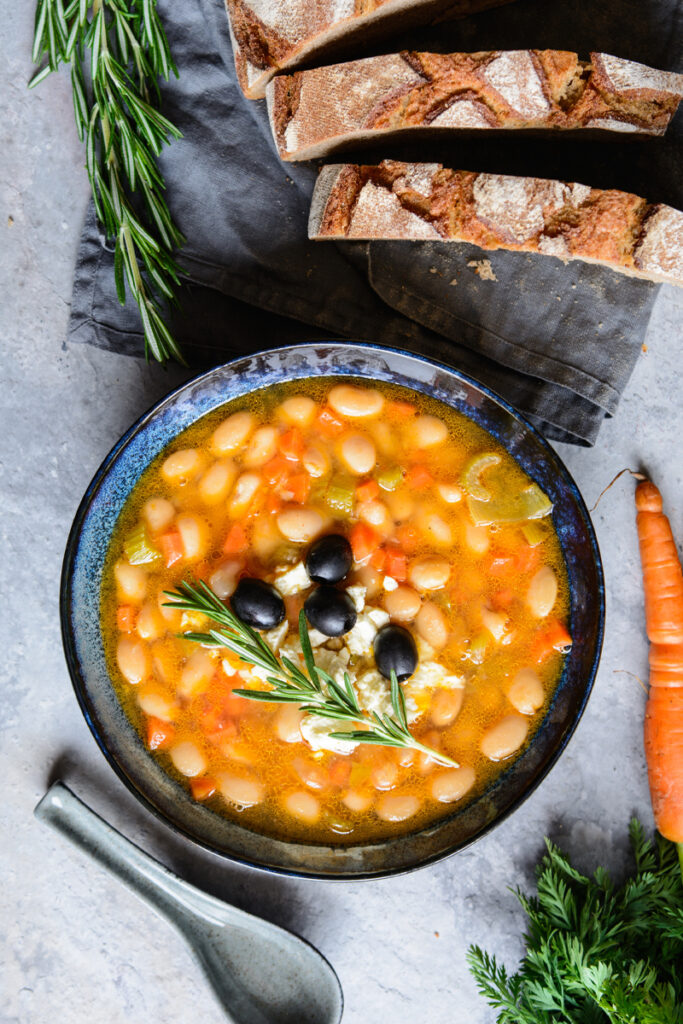
Serves 6
Prep: 25 minutes
Total 5-8 hours
Vegan and vegetarian friendly!
Ingredients:
- 1 lb dried cannellini beans
- 6 cups of hot water
- 1 large onion, finely chopped
- 2 carrots, sliced
- 1 ½ cups celery, chopped
- 1 large extra-ripe tomato, peeled and grated
- 1 tablespoon tomato paste
- ⅔ cups high-quality extra virgin olive oil
- Black pepper and red pepper flakes to taste
Instructions:
- Bring beans to a boil in a pot of water (8-10 cups)
- Cook for 5 minutes, strain
- Add beans and remaining ingredients to the slow cooker
- Cook for 5 hours on high, 8 hours on low
- Blend ½ cup of soup in a food processor or blender until smooth and stir back into the soup to thicken
- Turn off heat and let stand for 15-20 minutes
Traditional Horiatiki Salata (Authentic Greek Salad)
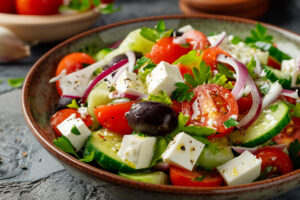
Serves 4-6
Prep: 15 minutes
Total: 15 minutes
Vegetarian friendly
Ingredients:
- 2 large cucumbers, peeled and sliced
- 5 vine ripe tomatoes, cut into wedges
- 1 green bell pepper, cored and cut into rings
- ⅓ red onion, cut into rings
- 1/4 to 1/3 of a cup of Kalamata olives (not pitted if possible)
- 8 oz Greek feta cheese in blocks (don’t crumble). Dodoni Feta Cheese is one of the best. Do not use crumbled feta
- 1/3 cup Extra virgin olive oil
- ¼ cup Red wine or White vinegar
- 1 Tablespoon dried oregano or more to taste.
- Salt to taste
Instructions:
- Thoroughly wash and dry the vegetables. Cut tomatoes into wedges, peel and slice the cucumber into thick rounds, core and cut green pepper into thick rings, and cut the onion into thin rings. Place all vegetables into a large bowl.
- Add a small amount of salt and gently mix the vegetables together.
- Beat the red wine vinegar and olive oil and pour over the salad.
- Add the kalamata olives and block of feta on top and sprinkle dried oregano. Drizzle salad with extra virgin olive oil.
- Serve immediately and enjoy!
Note: This is best served with crusty bread to dunk with and grab just the right amount of juices at the bottom of the bowl!
Also, an authentic Horiatiki salata does NOT include lettuce, parsley, or capers and no other vegetables, herbs, or spices.
Gemista (Greek Stuffed Vegetables) Recipe
This is a very traditional Mediterranean dish. It can be made with ground beef or not. If not, rice is the base and it is completely gluten-free and vegan. You could use turkey instead of beef to make it leaner.
This was my FAVORITE recipe growing up.
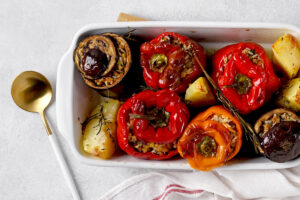
Serves 6
Prep: 30 minutes
Total: 2 hours
Ingredients:
- 10 large tomatoes
- 3 medium zucchini, cut in half
- 1 eggplant, cut in half
- 2 red bell peppers
- 2 green bell peppers
- 1 large onion, minced
- 2 cloves garlic, minced
- ½ cup parsley, minced
- ¾ cups of medium-grain rice
- 2 baking potatoes, peeled and cut into wedges
- ½ sweet potato, peeled and cut into wedges
- 1 lb lean ground beef (or substitute for turkey for a leaner recipe)
- ½ cup high-quality, extra virgin olive oil
- 1 cup of water
- 1 tablespoon tomato paste
- Salt and pepper to taste
Instructions
- Remove the cores of the bell peppers. Scoop out the insides of the eggplant, zucchini, and tomatoes and blend into a liquid. Set aside.
- In a large skillet, heat olive oil. Add onions and saute for one minute. Add ground beef and cook until browned. Mix in the parsley and garlic and cook for another minute.
- Stir in the blended vegetable insides, tomato paste, rice, ½ cup of water, and salt and pepper.
- Simmer for 15-20 minutes or until the excess liquid is absorbed by the rice.
- Preheat the oven to 350 degrees.
- Arrange the vegetables in a baking dish. Use the potato wedges to keep the other vegetables upright.
- Fill the tomatoes, eggplant, bell peppers, and zucchini ¾ of the way with the filling.
- Pour the remainder into the bottom of the baking dish and add ½ cup of water.
- Season with salt and pepper and drizzle with olive oil
- Bake covered for 1 hour, 15 minutes, or until the vegetables are tender.
- Remove cover and bake for 10 more minutes or until vegetables are browned.
A Week in the Mediterranean Diet
Creating a meal plan that follows the principles of the Mediterranean diet can help integrate this healthful and flavorful lifestyle into your routine. Whether your goal is weight loss, increasing your protein intake, or you’re looking for new healthy recipes to try, it’s hard to know where to begin.

Here’s a sample week with some of the best Mediterranean meals to get you started:
Monday
- Breakfast: Greek yogurt with honey and walnuts
- Lunch: Chickpea and vegetable salad with olive oil and lemon dressing
- Dinner: Pan-seared salmon with a side of quinoa and steamed veggies
Tuesday
- Breakfast: Oatmeal with sliced apples and cinnamon
- Lunch: Tuna salad stuffed in whole wheat pita
- Dinner: Grilled chicken thighs & veggie skewers with a side of wild rice
Wednesday
- Breakfast: Berry-almond smoothie bowl
- Lunch: Chickpea, corn & butternut squash soup with a slice of whole-grain bread
- Dinner: Baked trout with a lemon butter sauce and a side of asparagus
Thursday
- Breakfast: Poached eggs on whole-grain toast with tomato and avocado
- Lunch: Quinoa and arugula salad with cherry tomatoes, cucumbers, and feta cheese
- Dinner: Lentil salad with feta, tomatoes, cucumbers, and olives
Friday
- Breakfast: Fresh fruit salad with a dollop of Greek yogurt
- Lunch: Eggplant and bell pepper caponata over fresh greens
- Dinner: Seafood paella with a variety of shellfish and saffron rice
Saturday
- Breakfast: Pancakes made with whole wheat flour topped with fresh berries
- Lunch: Roasted salmon rice (or Couscous) bowl with roasted beets and carrots
- Dinner: Lamb chops grilled with rosemary and garlic, served with roasted potatoes and a Horiatiki Salata
Sunday
- Brunch: Omelet with spinach, tomatoes, and onions and crusty whole wheat bread
- Late Lunch: Pesto chicken thighs with basil and quinoa
- Dinner: Family-style serving of slow-cooker fasolada (Greek white bean soup) with crusty bread – a complete meal in itself!
Incorporate these meals into your week to enjoy not just the delicious flavors of the Mediterranean but also the lifestyle that celebrates eating together, sharing dishes, and enjoying the company of family and friends. This social component is key to the Mediterranean way, enhancing the enjoyment of meals and contributing to overall well-being.

Beyond the Diets: Living the Mediterranean Lifestyle
Adopting the Mediterranean lifestyle extends beyond the kitchen. Here are some tips to incorporate its principles into all aspects of your life:
- Prioritize Social Meals: Share meals with family and friends whenever possible. This practice not only makes eating a pleasurable experience but also tends to slow down your pace, which is better for digestion and satisfaction.
- Stay Active: Incorporate regular physical activity into your routine, whether it’s walking, cycling, swimming, or yoga. The key is to find activities that you enjoy and can do consistently.
- Leisure and Relaxation: Incorporate leisurely activities that reduce stress, such as reading, gardening, or crafting. The Mediterranean lifestyle values balance and relaxation.
- Community Involvement: Engage with your community. Attend local events, join clubs, or volunteer. Strong social ties can enhance your mental health and sense of belonging.
- Savor and Appreciate: Take the time to savor your food and appreciate where it comes from. This might mean shopping at local markets, growing your own herbs, or cooking more often at home.
These practices help cultivate a holistic approach to well-being, connecting the benefits of the Mediterranean diet with a fulfilling and active lifestyle – without counting calories.

Conclusion
As a Registered Dietitian with a background steeped in the Mediterranean lifestyle, I recognize the impact this diet can have on both health and well-being. The Mediterranean diet is a sustainable approach that integrates nutritious eating with a balanced lifestyle. It prioritizes fresh ingredients, moderate portions, and social mealtime experiences.
This lifestyle supports physical health and enhances mental wellness, making it more than just a diet—but a holistic way of living.
If you’re looking to improve your health while enjoying what you eat, adopting the Mediterranean way might be the right step.
I’m here to guide you through each phase, helping you create a tailored nutrition plan that aligns with your health goals and lifestyle preferences.

Download the Mindful Eating Journal to keep track of your meals and progress towards a more balanced lifestyle. For personalized guidance on how to adapt these Mediterranean recipes to your specific needs, don’t hesitate to book a call with me. Together, we can create a Nutrition Design that fits seamlessly into your lifestyle and helps you achieve your wellness goals. Start your transformation today!





